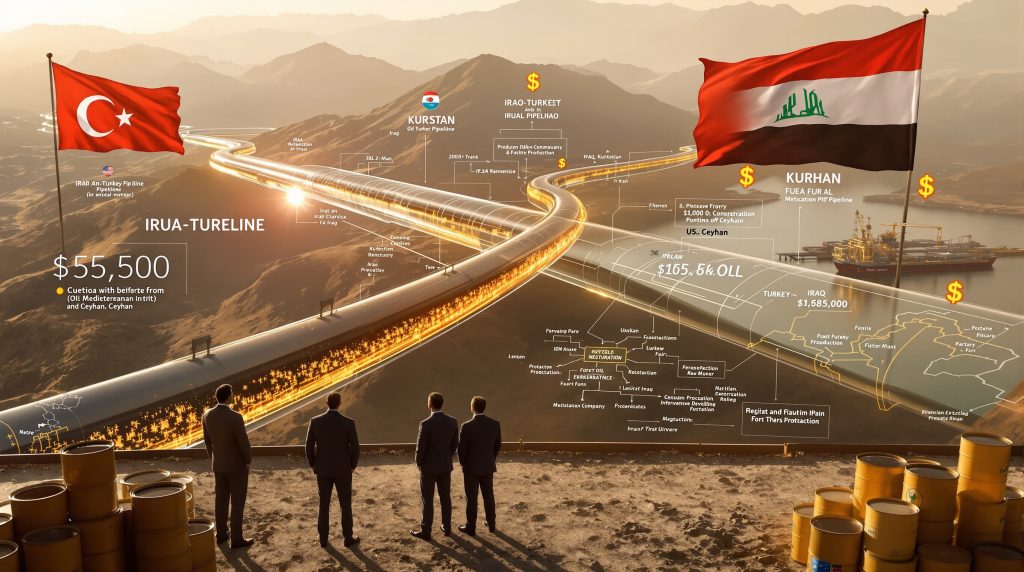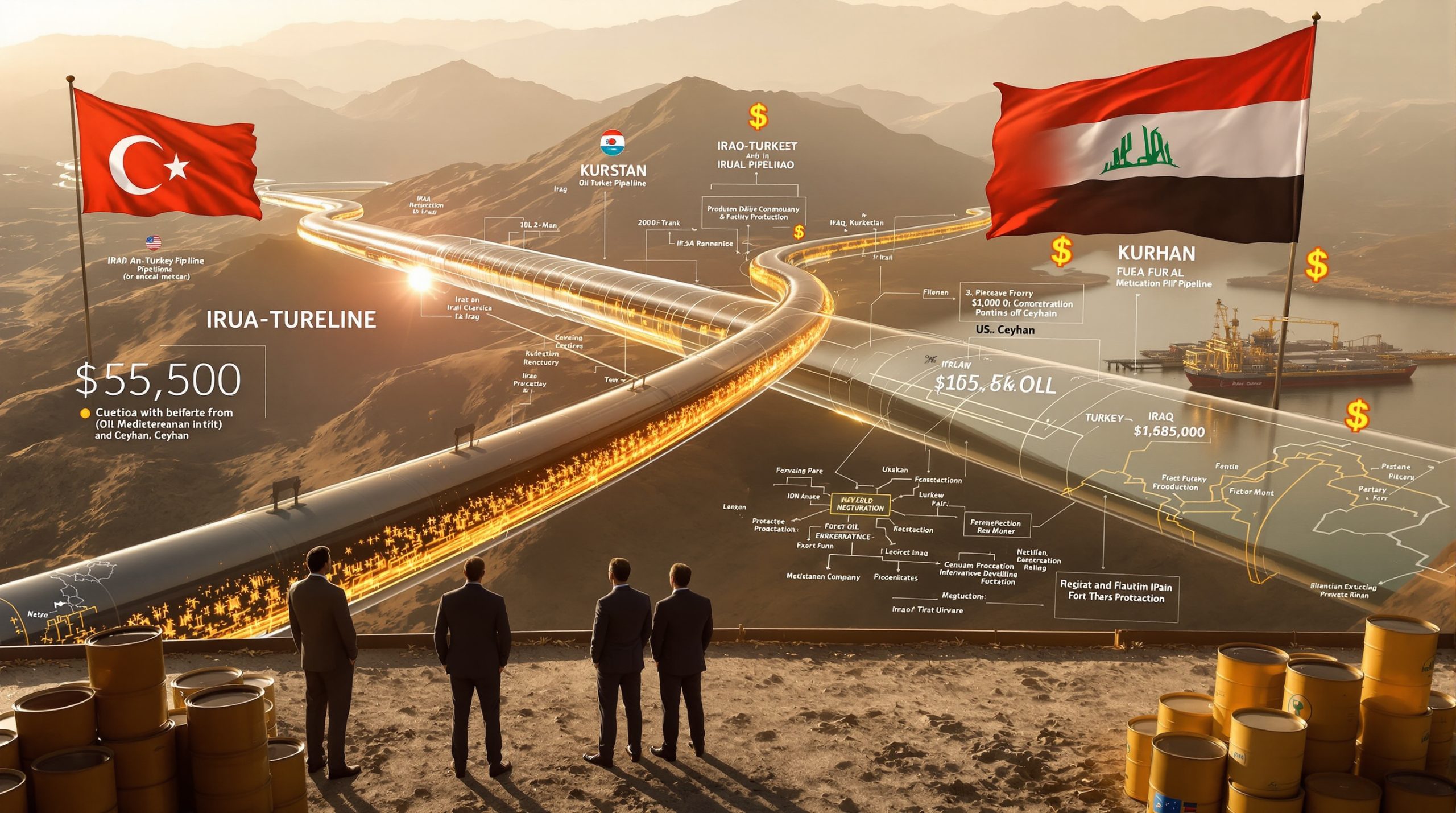What is the Current Status of Kurdistan Oil Exports to Turkey?
Kurdistan's oil exports to Turkey have resumed as of September 27, 2025, following a two-and-a-half-year suspension that began in March 2023. The restart follows complex negotiations between multiple stakeholders, including the Kurdistan Regional Government (KRG), Iraq's Federal Government (FGI), Turkey, international oil companies, and the United States. Currently, approximately 190,000 barrels per day (bpd) are flowing through the Iraq-Turkey Pipeline (ITP) from Kirkuk to the Mediterranean port of Ceyhan, with plans to increase this volume to 230,000 bpd in the near future.
A senior oil industry source working closely with Iraq's Oil Ministry indicates that U.S. policy impact on oil was the decisive factor in overcoming previous objections from Iraq's Federal Government and Turkey, demonstrating the significant geopolitical implications of the export resumption.
The pipeline operation represents a critical economic lifeline for the Kurdistan Region, providing essential revenue after years of fiscal challenges during the suspension period.
Export Volume and Economic Significance
- Current export level: 190,000 bpd through the ITP
- Target export level: 230,000 bpd (matching pre-2023 suspension levels)
- Additional 50,000 bpd reserved for domestic consumption within Kurdistan
- Estimated monthly revenue increase for Iraq's federal budget: $500 million
- Pipeline capacity: 1.5 million bpd (though currently significantly underutilized)
The export resumption agreement includes a transparent payment mechanism utilizing the U.S. Federal Reserve system, designed to provide financial accountability for all parties involved.
Why Did Kurdistan Oil Exports to Turkey Stop in 2023?
The 18-month suspension of oil exports stemmed from multiple interconnected disputes involving territorial sovereignty, revenue sharing, and international arbitration decisions.
The underlying tensions between Baghdad and Erbil regarding oil export authority have persisted for years, with the former consistently asserting constitutional control over all Iraqi oil exports while the Kurdistan Region has maintained its right to develop and export its own resources independently.
Key Factors Behind the Export Suspension
- International Chamber of Commerce Ruling: Turkey was ordered to pay $1.5 billion in damages to Iraq for unauthorized Kurdish oil exports between 2014-2018
- Pipeline Infrastructure Issues: Turkey insisted on "full usage" of the ITP (1.5 million bpd capacity) despite Iraq's preference for Asian export routes
- Revenue Distribution Disputes: Ongoing disagreements between Baghdad and Erbil over oil revenue sharing mechanisms
- Constitutional Authority Questions: Baghdad's assertion that all oil exports must be centrally managed by the federal government
The suspension created significant economic hardship for the Kurdistan Region, which relies heavily on oil revenue to fund its semi-autonomous government operations and public services.
How Does the New Kurdistan-Iraq Oil Agreement Work?
The September 2025 agreement establishes a new framework for Kurdish oil exports that attempts to balance regional autonomy with federal oversight.
This arrangement represents a fragile compromise, with both sides making concessions to restore the critical revenue stream. The payment structure is particularly significant as it attempts to address previous grievances while establishing a more transparent system.
Key Components of the Export Resumption Agreement
- All Kurdistan crude oil exports are handed over to Iraq's State Organization for Marketing of Oil (SOMO)
- $16 per barrel from sales is transferred to an escrow account for distribution to KRI oil producers
- Remaining revenue flows to SOMO and the federal government
- Payment mechanisms utilize the U.S. Federal Reserve to ensure transparency
- Joint monitoring by Kurdish and Iraqi oil authorities
This arrangement replaces a previous offer of $7.90 per barrel that was rejected by the KRG and bears similarities to the landmark deal initially drawn up in November 2014, which allocated 17% of Iraq's budget to the KRG in exchange for 550,000 bpd of oil exports.
The $16 per barrel allocation effectively acts as a subsidy for production costs incurred by international oil companies operating in the KRI, addressing one of their key concerns about continued operations in the region.
What Challenges Threaten the Sustainability of Kurdistan Oil Exports?
Despite the resumption of exports, several significant challenges threaten the long-term viability of the current arrangement.
Industry analysts point to the history of failed agreements between Baghdad and Erbil as reason for caution about the sustainability of this latest deal. The complex web of regional politics, economic interests, and international influence creates an inherently unstable foundation.
Outstanding Debts to International Oil Companies
International oil firms operating in Kurdistan are collectively owed over $1 billion in unpaid debts for previously produced and sold oil. Key companies affected include:
- Norway's DNO and joint venture partner Genel Energy: Approximately $300 million in outstanding payments
- Eight additional foreign oil producers that signed the initial restart agreement
These companies have stipulated that a debt settlement mechanism must be established within 30 days of the export resumption (by October 27, 2025) to ensure their continued participation.
At a July 12 meeting, foreign oil companies emphasized their requirements for:
- Export payments consistent with existing, legally valid contracts
- Transparent and prompt payment mechanisms
- Either cash payments or in-kind transfers of crude oil entitlements
Political Opposition to Kurdish Autonomy
Several powerful stakeholders fundamentally oppose Kurdish regional autonomy in oil matters:
- Baghdad's Federal Government: Views centralized control of all oil resources as essential for national sovereignty
- Turkey and Iran: Both countries have significant Kurdish populations and oppose any precedent for Kurdish independence
- China and Russia: Support Baghdad's centralization efforts as part of broader geopolitical strategy in the Middle East
Iraqi Prime Minister Mohammed Al-Sudani has explicitly stated that the new unified Oil Law will govern all oil and gas production in both Iraq and the Kurdistan region, constituting "a strong factor for Iraq's unity" – a clear indication of Baghdad's intent to maintain centralized control.
What is the Geopolitical Context of Kurdistan Oil Exports?
The Kurdistan oil export situation represents a microcosm of broader Middle Eastern geopolitical competition between global powers.
The region has become a battleground for influence between the Global North and Global South power blocs, with energy resources serving as both the prize and the leverage in this complex international game.
U.S. Strategic Interests in Kurdistan
- Views the KRI as a strategic partner and bridge from NATO member Turkey into the Middle East
- Seeks to reduce Iraq's energy dependence on Iran through alternative supply routes
- Utilizes the Kurdistan Region as a base for regional monitoring operations
- U.S. Secretary of State publicly acknowledged Washington's role in facilitating the export resumption deal
In March 2025, according to a senior Washington legal source, the U.S. impressed upon Prime Minister al-Sudani the importance of Iraq becoming energy independent and reducing reliance on Iranian gas and electricity purchases, linking this to potential U.S. investment opportunities.
Competing Global Interests
- China, Russia, and Iran: Support Baghdad's drive to centralize control over all Iraqi oil resources
- Western Powers: Generally support Kurdish autonomy as a counterbalance to Iranian influence in Iraq
- Regional Powers: Turkey and Iran oppose Kurdish independence movements due to concerns about their own Kurdish populations
A senior energy source who works closely with Iran's Petroleum Ministry has indicated that "keeping the West out of energy deals in Iraq" serves the broader objective of "ending Western hegemony in the Middle East," highlighting the strategic significance of these oil export arrangements.
How Have Previous Kurdistan-Iraq Oil Agreements Fared?
Historical context suggests caution regarding the durability of the current export arrangement, as multiple previous attempts at cooperation have collapsed amid mutual accusations of non-compliance.
The cyclical pattern of agreements and breakdowns demonstrates the fundamental tensions between Kurdish autonomy and federal control that remain unresolved.
The 2014 Agreement and Its Failure
The November 2014 deal between Kurdistan and Iraq's federal government established that:
- The FGI would pay the KRG 17% of Iraq's monthly budget (approximately $500 million)
- In exchange, the KRG would organize exports of up to 550,000 bpd from Kurdistan oil fields and Kirkuk to SOMO
This agreement collapsed as both sides accused each other of failing to fulfill obligations, with Baghdad claiming insufficient oil deliveries and Kurdistan citing unpaid budget allocations.
The 2017 Independence Referendum Fallout
Following Kurdistan's September 2017 referendum on independence (which saw over 90% of voters favor independence):
- Baghdad declared the vote unconstitutional
- Federal forces took control of the disputed oil-rich Kirkuk region
- International flights to Kurdistan were restricted
- Baghdad called on international buyers to stop purchasing Kurdish oil directly
The referendum severely damaged relations between Erbil and Baghdad, leading to punitive economic measures that highlighted the federal government's determination to prevent Kurdish independence.
What Economic Impact Will Resumed Exports Have?
The resumption of oil exports carries significant economic implications for multiple stakeholders, potentially revitalizing Kurdistan's economy while bolstering Iraq's federal revenues.
The economic benefits must be weighed against the political concessions made by the KRG in terms of control and autonomy.
Financial Benefits
- Kurdistan Region: Critical revenue stream restored after years of economic hardship
- Iraq's Federal Budget: Potential increase of up to $500 million monthly
- Turkey: Reactivation of the Ceyhan export terminal and associated fees
- International Oil Companies: Potential pathway to recover outstanding debts and resume profitable operations
The financial impact is particularly significant given the challenging economic conditions in both Kurdistan and Iraq proper, with budgetary constraints limiting public services and investment.
Market Implications
- Global Oil Supply: Addition of approximately 190,000-230,000 bpd to global markets
- Regional Energy Dynamics: Strengthened east-west energy corridor through Turkey
- Investment Climate: Improved outlook for international investment in Kurdistan's energy sector, contingent on stability of the new arrangement
While the volume is relatively modest in global terms, the resumption of exports has symbolic importance for regional energy security and cooperation. Analysts are closely watching oil price movements to assess the market's reaction to this development.
How Does Turkey Factor into the Kurdistan Oil Export Equation?
Turkey plays a pivotal role in the Kurdistan oil export situation due to its geographic position and political interests.
As the necessary transit route for KRI exports to reach international markets, Turkey wields significant leverage in negotiations, balancing economic benefits against political concerns.
Turkey's Dual Interests
- Economic Benefits: Revenue from pipeline transit fees and port operations at Ceyhan
- Political Concerns: Opposition to Kurdish independence movements that could inspire its own Kurdish population
- Energy Hub Aspirations: Desire to position itself as a critical energy corridor between Middle Eastern producers and European markets
Turkey's insistence on "full usage" of the ITP (1.5 million bpd capacity) reflects its ambition to maximize economic benefits from transit fees while establishing itself as an indispensable energy hub.
Turkey-Iraq Relations
- Historical tensions over Turkey's military operations against Kurdish groups in northern Iraq
- Ongoing dispute over the $1.5 billion ICC arbitration award for unauthorized exports
- Turkey's insistence on "full usage" of the ITP (1.5 million bpd) despite Iraq's preference for Asian export routes
The delicate balance in Turkey's approach—supporting pipeline operations while opposing Kurdish independence—illustrates the complex calculations that all regional actors must make.
What Role Do International Oil Companies Play in Kurdistan?
Foreign oil firms have been crucial to developing Kurdistan's oil sector but face significant challenges regarding payment security and operational certainty.
Their continued presence and investment are essential for maintaining and expanding Kurdistan's production capacity, making their concerns a critical factor in the export resumption arrangement.
Major Players and Investments
- International oil companies have collectively invested billions in Kurdistan's oil infrastructure
- Key operators include DNO, Genel Energy, and several other international firms
- These companies are owed over $1 billion in outstanding payments
The development of Kurdistan's oil resources has required substantial technical expertise and capital investment that only international firms could provide, creating a mutual dependency.
Operational Requirements
At a July 12 meeting, foreign oil companies operating in Kurdistan emphasized their needs for:
- Export payments consistent with existing, legally valid contracts
- Transparent and prompt payment mechanisms
- Either cash payments or in-kind transfers of crude oil entitlements
The upcoming debt settlement mechanism negotiations (due by October 27) will be crucial for determining whether these companies maintain their operations in the region long-term.
What Does the Future Hold for Kurdistan Oil Exports?
The sustainability of Kurdistan's oil exports to Turkey remains uncertain due to competing interests and unresolved issues.
The fundamental tensions between Kurdish autonomy aspirations and Baghdad's centralization objectives suggest that the current arrangement represents an uneasy truce rather than a permanent solution.
Short-Term Outlook
- Exports expected to continue at 190,000 bpd, potentially increasing to 230,000 bpd
- Critical 30-day deadline (October 27, 2025) for establishing debt settlement mechanism with international oil companies
- Ongoing monitoring of compliance with the new agreement by all parties
The immediate focus will be on meeting the terms of the current agreement and resolving outstanding payment issues with international oil companies. The situation may also be influenced by the broader OPEC production impact on global markets.
Long-Term Uncertainties
- Persistent constitutional disputes over Kurdistan's right to manage its oil resources
- Geopolitical competition between global powers with interests in Iraq
- Turkey's dual economic and political considerations regarding Kurdistan
- Baghdad's continued push for centralized control over all Iraqi oil exports
As one Washington-based energy analyst notes: "This agreement doesn't resolve the underlying constitutional questions about who controls Kurdistan's oil resources. It simply creates a temporary working arrangement that all sides can live with for now." The agreement's stability may be further affected by US oil production decline and shifting global energy dynamics.
FAQ: Kurdistan Oil Exports to Turkey
When did Kurdistan resume oil exports to Turkey?
Kurdistan resumed oil exports to Turkey on September 27, 2025, following a two-and-a-half-year suspension that began in March 2023, according to reports from CNBC.
How much oil is Kurdistan currently exporting to Turkey?
Currently, approximately 190,000 barrels per day (bpd) are flowing through the Iraq-Turkey Pipeline, with plans to increase to 230,000 bpd.
Who controls the revenue from Kurdistan oil exports?
Under the new agreement, Iraq's State Organization for Marketing of Oil (SOMO) handles all sales, with $16 per barrel allocated to an escrow account for distribution to Kurdistan's oil producers and the remainder going to the federal government.
What caused the suspension of exports in 2023?
The suspension resulted from multiple factors, including an ICC ruling requiring Turkey to pay $1.5 billion to Iraq for unauthorized exports, disputes over revenue sharing, and constitutional disagreements about oil export authority.
Could exports be suspended again?
Yes, several factors threaten the sustainability of the current arrangement, including outstanding debts to international oil companies, fundamental opposition to Kurdish autonomy from Baghdad and regional powers, and competing geopolitical interests. According to analysts at Oilprice.com, the long-term viability remains questionable.
Disclaimer: This article contains speculative analysis about geopolitical relationships and future outcomes based on current information. Economic and political conditions in the region are subject to rapid change, and readers should consult multiple sources when making investment or policy decisions related to Kurdistan oil exports to Turkey. For further understanding of global energy markets, consider following oil futures trends.
Looking For The Next Market-Moving Mineral Discovery?
Discovery Alert's proprietary Discovery IQ model instantly identifies significant mineral discoveries on the ASX, providing real-time alerts that give subscribers a crucial market advantage. Explore historic examples of exceptional returns from major discoveries by visiting our dedicated discoveries page and start your 30-day free trial today.




